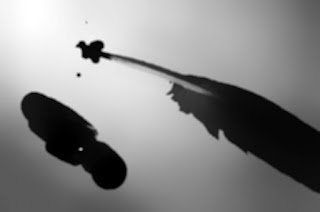Oh, Hallows No
No, it's not pronounced 'Sam hayn.' It's pronounced closer to 'sa-oo-hwen'.
That is the major pagan celebration, from what I understand, that gave birth to the eventual holiday of Halloween. What, then, was it a celebration of?
First, disregard that I ended that last sentence with a preposition. It's time to let go of that rule (at). Secondly, it was a feast to celebrate the end of the harvest and the survival of those who made it through the year, up to that point. Pagans would gather all of their family and friends, light a huge bonfire, and bring a bunch of food they'd harvested, and eat, drink, and be merry.
This was an especially important time for them to do this, because what was coming was the 'dark half' of the year, when nothing grows and it's deadly cold. The dark half is where women would lose their babies, when children and the elderly would get sick, and when there was no guarantee all would have food or warmth, possibly even shelter, until the light half of the year began.
The pagans were also quite superstitious, and they thought, since the imminent dangers of the coming months were so great, that the veil between the living and the dead was thin to the point where the dead might join the celebration. Instead of this being a reason to be afraid, though, the pagans saw this as a chance to reunite with loved ones who had passed away, as well as ancestors who hadn't been forgotten.
The only holiday I can think of, from this information that's probably perforated with missing information or misinformation, is Dia de Los Muertos in Mexico. The holiday that is the absolute farthest away from this origin, sadly, is our modern day Halloween.
Halloween was a re-appropriated holiday appointed by the Catholic church. It was a time to instill fear into the pagans about their beliefs, and the core of their celebration being what one might call gluttony and devil worship (appearing to call people to rise from their graves.) So, the old Catholics used those two features as weapons, telling them that glutting on their harvests was a deadly sin, and that they weren't talking to their dead but summoning the devil.
Now, when the staunchly Catholic Irish started to immigrate to the United States, they found that the protestant Americans didn't recognize any Catholic holiday, including Christmas or Halloween. So, they started to celebrate these holidays independent of their indigenous neighbors. Because of this, the Irish carried with them the motif of evil in relation to Halloween, including demonized versions of ancient Samhain icons like bats, ghosts, spiders, leafless trees, moonlight, cloudy nights, etc. Modern culture has multiplied these tropes with capitalism, so, now we have them as decorations and costumes.
While the culture of Halloween was multiplying, teenagers and children of the early 1900's started to use Halloween as an excuse to pull pranks -- or, 'tricks' -- to the point where parents and government officials started to bribe them using candy or pastries -- or, 'treats' -- to get them to stop terrorizing their communities. The old Irish tradition of going door to door for food -- or, 'begging' -- dove-tailed into modern day trick-or-treating.
While the culture of Halloween was multiplying, teenagers and children of the early 1900's started to use Halloween as an excuse to pull pranks -- or, 'tricks' -- to the point where parents and government officials started to bribe them using candy or pastries -- or, 'treats' -- to get them to stop terrorizing their communities. The old Irish tradition of going door to door for food -- or, 'begging' -- dove-tailed into modern day trick-or-treating.
All of this is to say, Happy Halloween, emphasis on the word 'happy'. You should be happy on Halloween! You should be celebrating with your family and friends. You should be remembering your loved ones who have moved on, and use the holiday as a way to look forward to the coming Winter.
Most of all, you should file a harassment suit against those kids and their parents threatening to trick you, some way, in exchange for toys and candy. Do not abide.




Comments
Post a Comment